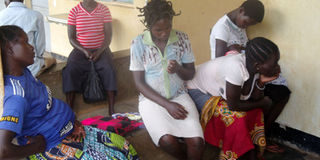Gulu grapples with teenage mother cases

Services. Some of the teenage mothers wait to be attended to at Patiko Health Centre III in Gulu District on February 21, 2017. PHOTO BY POLYCAP KALOKWERA
What you need to know:
- KITGUM. The Kitgum Resident District Commissioner, Mr William Komakech, has proposed a ban on smart phone use by teachers during class hours, arguing that the devices distract them from their duties.
- Mr Komakech said applications on smart phones such as Facebook and WhatsApp tend to distract attention of teachers as they spend a lot of time following trending topics on social media, making them less productive.
Ms Alice Akanyo, 18, is attending antenatal care services at Patiko Health Centre III in Gulu District for her second child.
Ms Akanyo had her first child when she was 16, after dropping out of school. She is among the many teenage mothers in the district.
“Having children at an early stage was not my wish but I found myself becoming one. Although I have regrets but it was beyond my control,” she says.
Ms Akanyo dropped out of school while in Primary Five because her parents could not afford the basic school requirements so she sought solace marriage. However, she says marriage has also become a nightmare.
Ms Prossy Lanyero, 19, a mother of two, who had her first child at17, says she was influenced by the parents to get married so that some family members benefit from the dowry paid.
“I was forced to get married so that dowry is paid and in return it is used by my elder brother to marry a woman,” she says.
Sr Cecilia Ayot, senior midwife at Patiko Health Centre III, says out of 15 mothers who visit the centre for antenatal check-up every day, 10 are child-mothers between the ages of 15 and 19. She blames the rising cases of teenage pregnancies on parents who, she says do not bother about the future of their daughters but rather take to drinking alcohol.
“I think as parents we are not doing enough to support our daughters against early teenage pregnancies and we pretend to be busy doing a lot of nothing,” Sr Ayot says, adding that government cannot do much to fight early pregnancies without the support of parents.
She says many of the child-mothers are not supported by both their husbands and parents after getting pregnant, which is putting their lives in danger.
“We have to support them whether we like it or not because not supporting will worsen the situation since they are too young to know the complications that come with pregnancy,” she adds.
Ms Florence Ocitti, a retired senior midwife, who also double as executive director of Village Birth International, an organisation helping expectant mothers at village level, says: “It is depressing and annoying to see young girls getting pregnant to fellow teenagers yet they are the future of this great nation.”
She says out of 60 expectant mothers who reach out for antenatal care weekly in the districts of Gulu, Omoro and Nwoya, 40 are child-mothers.
“I attribute increasing cases of early pregnancies to parents who at times prefer trading their daughters in exchange for dowry thinking it will resolve their financial constraints in the homes,” Ms Ocitti says.




